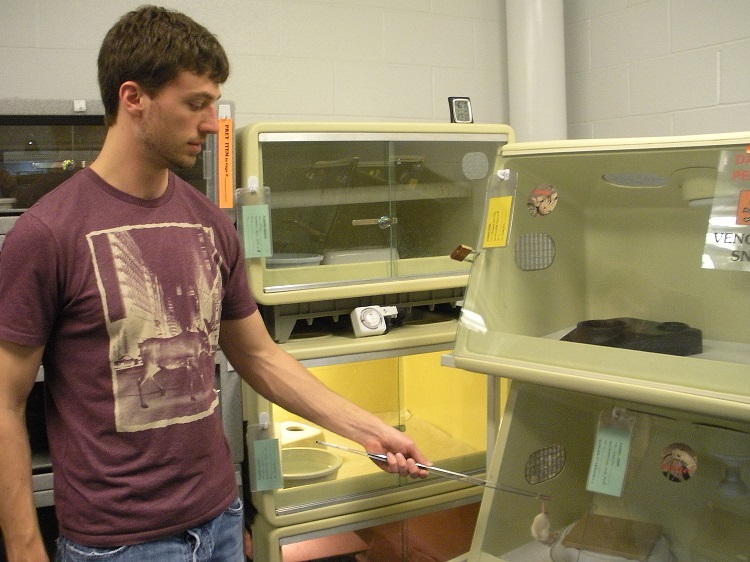
It all started with a simple visit to Hardin Hall.
"Before I applied to UNL, I came to Hardin Hall and spoke to Dennis Ferraro," said Dylan Maag, a senior fisheries and wildlife major from Lincoln. "I was always interested in animals – particularly reptiles – as I grew up, and I wanted his opinion on the university and what major would fit my interest best."
That conversation led Maag to finding his academic home in the School of Natural Resources.
"Around my sophomore year, I chose conservation biology as my option in my major," Maag said. "This was due to my continued interest in herpetofauna, which are almost never a game species and more of them are endangered/threatened. I also like the course work that corresponded to that option."
Maag also has mathematics and plant biology minors.
"Academically, I have vastly grown since coming to college," he said. "My work ethic has improved. I found myself studying more for classes as I grew older and engaging in out-of-class academic opportunities."
Those opportunities include everything from venturing through the El Yunque National Rainforest in Puerto Rico to capturing prairie rattlesnakes in western Nebraska to serving as a teaching assistant in several classes.
"The students in SNR set a pretty high standard," Maag said. "A challenge is living up to my peers in the school. Almost all of my friends and peers in SNR belong to a club and are very active within it, they are great students in the classroom, and most of them actively work with a professor on their own research."
Maag said that seeing his fellow students succeed both in and out of the classroom is a major motivator.
"I like challenges," he said. "So this friendly competition spurred me into action and drove me to be the best student, peer and friend that I can be."
As a junior, Maag began his undergraduate research alongside Ferraro, studying the prey procurement and strike behavior in selected venomous snakes of the Crotalidae family. He received UCARE funding as a junior and senior to conduct the research, which culminated in his submitting a paper to the Journal of North American Herpetology.
Maag also presented his research at the recent Kansas Herpetological Society annual conference.
"I was lucky enough to have come into SNR with a specific interest in herpetology," Maag said. "There are so many good professors and opportunities within the school that it is hard to pick just one or two."
Ferraro said that Maag is well-suited to the demands of working with and among wildlife.
"Dylan's inquisitive nature pushes him to analytically investigate what he encounters in the natural environment," said Ferraro, professor of practice. "His enthusiasm allows him to adjust to the rigor that is working with wildlife. When confronted with obstacles in a project, Dylan has shown great composure and the ability to employ critical thinking to solve such issues."
Maag's academic drive is evidenced by the numerous scholarships he's received throughout his academic career, including the IKE-Grand Island Scholarship, Brain Smith Memorial Scholarship, Robert E. Thomas Memorial Scholarship, IWLA Nebraska Division Scholarship and the Nebraska IWLA Award.
"Receiving these scholarships told me that the committees and donors associated with each one have taken an interest in my current and future schooling and research," Maag said. "Also, the fact that I was awarded these scholarships tells me that I need to live up to the committees' and donors' expectations. I have worked to rise up and overcome this challenge."
After graduating this month, Maag will continue working as a seasonal employee at the Pioneers Park Nature Center and as a TA for Donald Lee’s genetics class. He'll also be awaiting the results of his graduate school applications.
"Currently I am applying to four different graduate schools as a master's in biology graduate student," Maag said. "Wherever I go, I would want to conduct my research on venomous snakes with minor variations at each school. Working with Dennis Ferraro and Andrew Tyre helped me greatly in my progression as a researcher and will help me in my future research as a graduate student and beyond."
— Mekita Rivas, Natural Resources